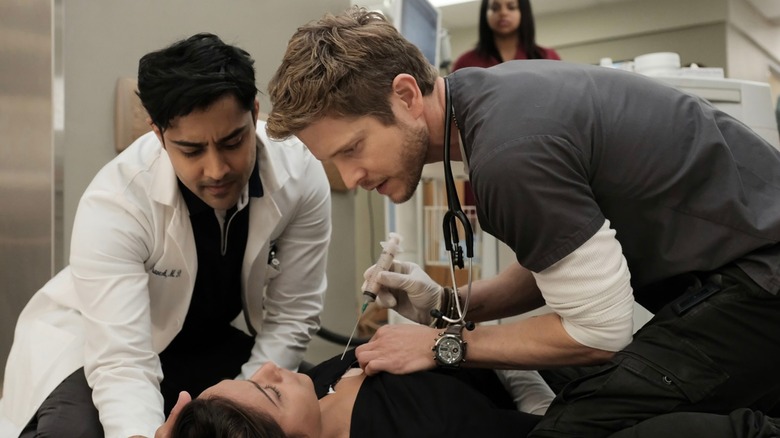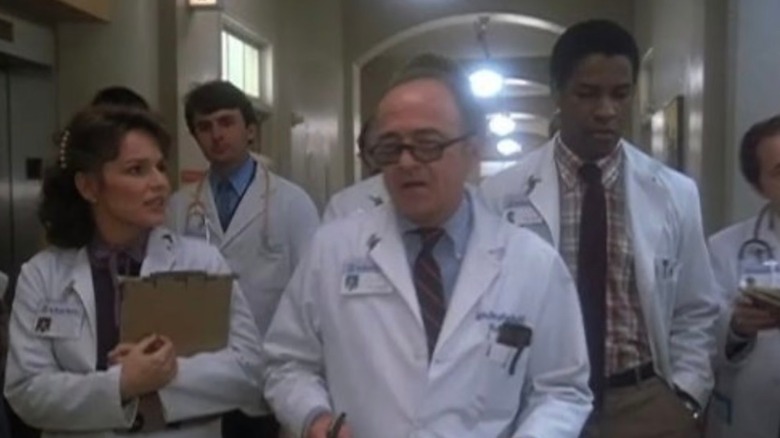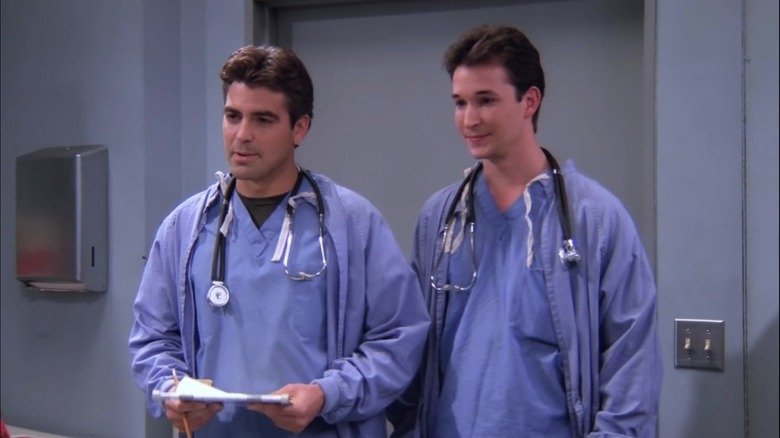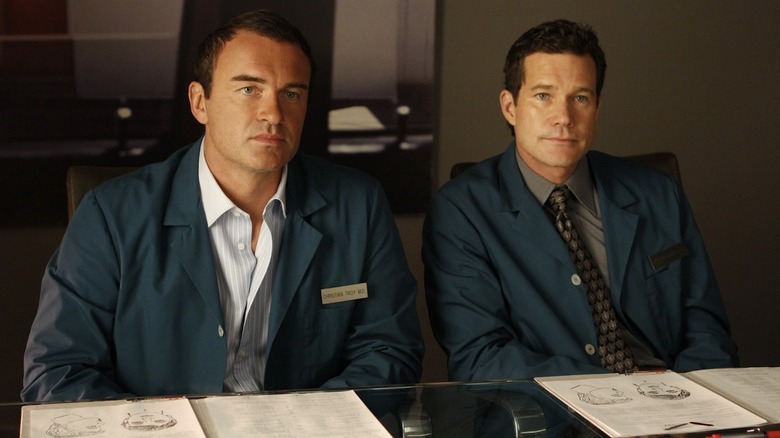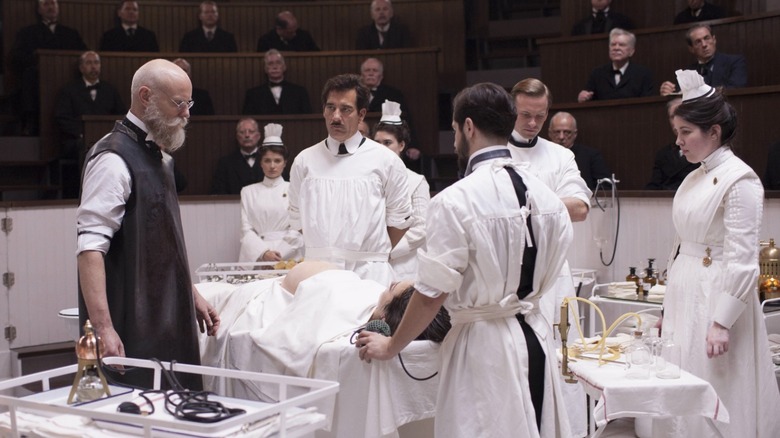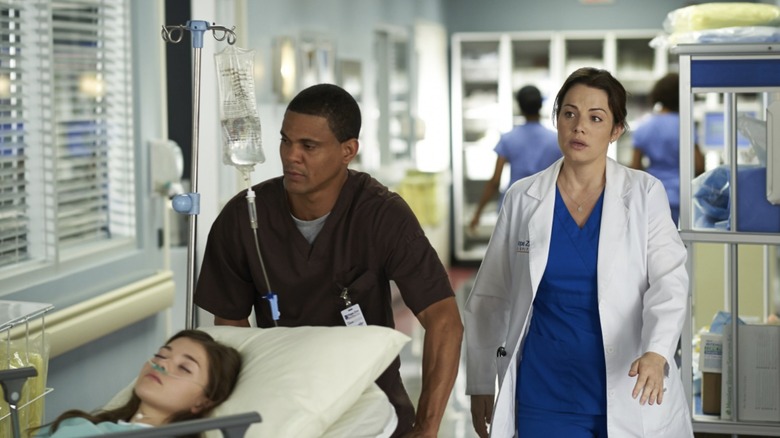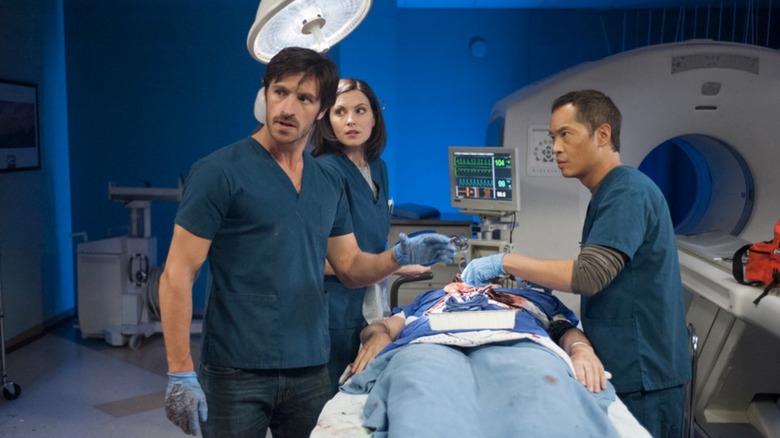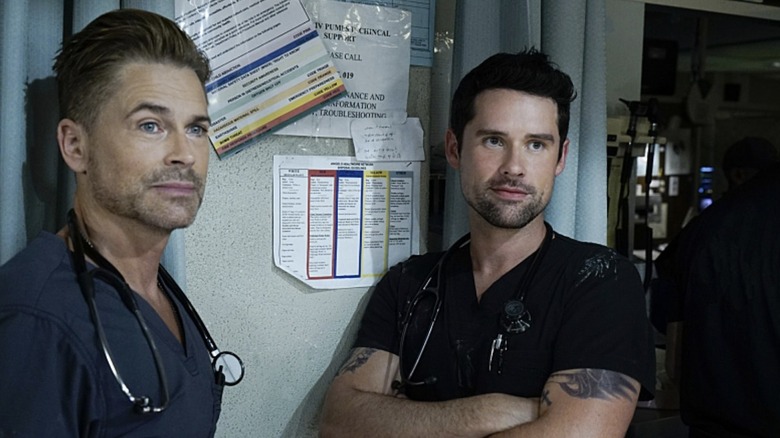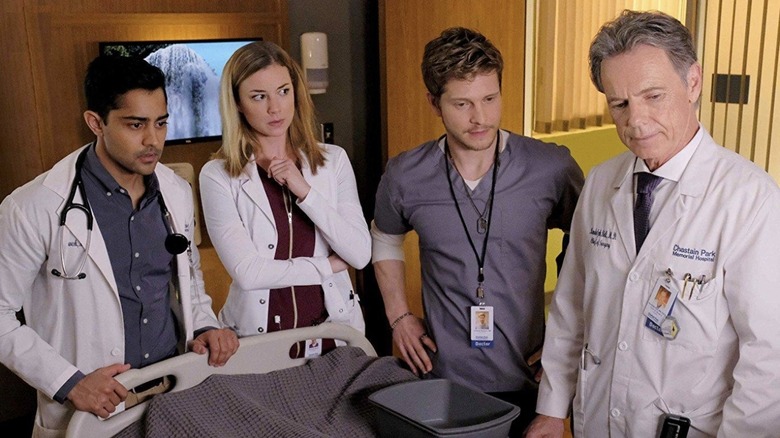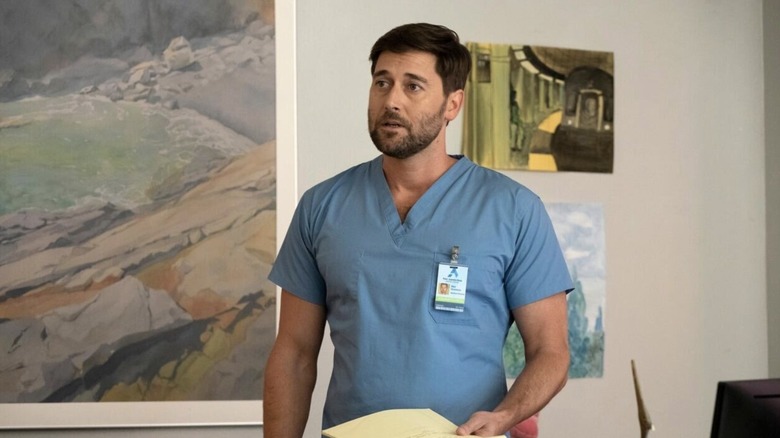All The Reasons These 11 Medical Dramas Got The Ax
Medical dramas have been network television's bread and butter for decades. The intensity of the emergency room, the long hours spent with co-workers at the hospital, and the big egos of high-level specialists are ripe for interpersonal drama, engaging storylines, and medical mysteries. Almost every network dabbles in this genre, and some networks have multiple medical dramas running concurrently.
But just because a genre is popular with audiences, that doesn't mean a series can go on indefinitely — unless, of course, that series is "Grey's Anatomy," which is currently the longest-running prime-time medical drama on American broadcast television, boasting over 400 episodes and counting. The longer a series stays on the air, the more cast changes it will experience, and sometimes the series just doesn't have the same draw for audiences it once had.
While some hit shows end on their own terms when the stars are ready to move on, as "Seinfeld" and "Home Improvement" did, most network series end with cancellation, and this is true even for series that were once the best performers in their time slot. Nothing lasts forever, and some series linger past their natural expiration date. Stick with us as we explore the myriad of reasons these medical dramas got the ax.
St. Elsewhere was canceled because it wasn't popular enough for syndication
If you're a big fan of modern medical dramas, you have "St. Elsewhere" to thank for improving and popularizing the genre. The series ran on NBC for six seasons and pushed the boundaries of television with its dark humor and gritty storytelling. "St. Elsewhere" followed the staff of St. Eligius, an aging South Boston Hospital known for being understaffed, underfunded, and overrun with patients. The series made Denzel Washington, Mark Harmon, and Howie Mandel stars, and had an excellent ensemble cast.
Although "St. Elsewhere" was never a big hit with huge numbers, it was well-regarded in the industry, winning 13 primetime Emmys, and was popular with a select group of young affluent viewers. The series garnered good advertising dollars because of this audience's demographics, which helped keep the series on the air longer than most series with mediocre ratings.
Ultimately, "St. Elsewhere" cost more to make than NBC paid the production company MTM for the rights to broadcast the series on their network. With little interest in syndication deals, the production studio simply couldn't financially justify keeping the series alive any longer than they had. "If NBC had started paying us more money, they would have had to start giving a lot of other people more money, too," executive producer Bruce Paltrow told The Los Angeles Times. He added, "There are no villains in this piece." Fortunately, the writers had ample notice the series was ending and delivered a thought-provoking finale.
ER was canceled for declining viewership and ratings after 15 seasons
When ABC debuted "ER" in 1994, no one knew how successful it would be. It became a television juggernaut, and at one point it was consistently the highest-rated show on broadcast television. "ER" built its storytelling around complex and fallible characters, weaving weekly medical mysteries with story arcs centered on the personal and professional lives of the County General Hospital in Chicago staff.
The series was created by Michael Crichton, who took inspiration from his time as a medical student before he became a successful writer. A huge ensemble cast of actors cycled through "ER" during its 15-season run, launching the careers of George Clooney, Noah Wyle, and Julianna Margulies. Any series that stays on air for over a decade will see characters come and go, and this was certainly true for "ER." By the end of the series, there weren't many familiar faces from the early days.
Although "ER" cemented quite a few acting careers over the years and provided steady work for supporting players, eventually the bloom faded. The series' viewership declined, leading to the medical drama being canceled in 2009. When "ER" first hit screens, it was at the top of most watched television shows for years, but by Season 14 it was number 54, according to ABC. Nothing lasts forever, even epic shows like "ER."
Nip/Tuck was canceled because they didn't want the series' quality to suffer
"Nip/Tuck" was an early example of FX's move toward original programming. It's a fabulous and supremely entertaining look at the cosmetic surgery world, following plastic surgeons Dr. Sean McNamara (Dylan Walsh) and Dr. Christian Troy (Julian McMahon). These business partners in Miami (and later Los Angeles) begin each consultation with the catchphrase, "Tell me what you don't like about yourself."
Despite being popular, FX made the surprising decision to announce "Nip/Tuck" had been canceled, despite having an outstanding order of 19 episodes for its final season, ensuring the series would reach the 100-episode milestone. "If you tried to do 150 episodes of 'The Sopranos,' you would begin to diminish the quality of those shows," John Landgraf, FX president announced at Television Critics Association presentation. He added, "If we want to go after that brass ring, we have to accept they have limited shelf life."
The beauty of announcing a cancellation to the series in the middle of the fifth season, with one more season ahead, was that the writers had ample time to craft a satisfying conclusion to the Ryan Murphy series that both shocked and tantalized fans with its dark humor and completely bonkers story arcs. After "Nip/Tuck" ended on FX, it gained a new audience and had another successful run on Netflix, the streaming pioneer having bought the rights for off-cable syndication. In 2020, "Nip/Tuck" moved to Hulu.
Kate Walsh's exit from Private Practice contributed to the series' cancelation
Although "Private Practice" never reached the soaring heights of "Grey's Anatomy," the spin-off series following Kate Walsh's character, Dr. Addison Forbes Montgomery, from Seattle to Los Angeles and had a solid following. When Shonda Rhimes' newer series "Scandal" bumped "Private Practice" from its slot after "Grey's Anatomy," the medical drama lost viewers and its ratings fell.
Walsh's contract ended with Season 5, but she agreed to stay on for 13 episodes of Season 6, leading to speculation that without its leading lady, this could be the series' last season. Before the season started, it was announced Tim Daly, who portrayed Dr. Pete Wilder, would not be returning for Season 6. Despite losing key characters, Rhimes was instructed by the network not to approach Season 6 as an ending. "I'm percolating something and trying to figure out if it'll work and how I feel about it and what it means," Rhimes told The Hollywood Reporter.
It seems the exit of these two central figures was the final nail in the series' coffin, and Rhimes announced the cancellation of the series via Twitter, writing, "There was a lot of discussion and debate but, in the end, the guys at the network and the studio and I all decided that 'Private Practice' was reaching its finish line." The medical drama ended mid-season with Walsh's exit after an abbreviated 13-episode season.
The Knick was canceled because it didn't fit Cinemax's brand
"The Knick" is a period medical drama set at the Knickerbocker Hospital in Manhattan at the dawn of the 20th century. The series follows Dr. John W. Thackery (Clive Owen), a brilliant but troubled surgeon who is promoted to head of surgery after his superior takes his own life. The series explores the glacial pace of medical advancements, substance abuse amongst physicians, and the entrenched racial prejudices Dr. Algernon Edwards (André Holland) must navigate as a Black doctor.
"The Knick" was Cinemax's move into prestige television, and director Steven Soderbergh planned to make the series into an anthology, with each story arc spanning two seasons, exploring advancements in medicine. Soderbergh wanted to shoot Season 3 in anamorphic black-and-white, and admitted in a Reddit thread, "It's POSSIBLE that may have contributed to its demise."
It wasn't until 2017 that Cinemax announced they wouldn't be moving forward with a third season of the series. "After a critically acclaimed two-season run of 'The Knick' on Cinemax, we will not be going forward with additional episodes of the series," Kary Antholis announced, explaining the network would be returning to their traditional action-oriented fare. "The show did not do for Cinemax what it was intended to do, which was to help rebrand and draw new eyeballs to the channel," Soderbergh told Rolling Stone. Still, there is talk of a spin-off starring Holland in development at HBO.
Saving Hope was canceled because it didn't gain a large U.S. audience
"Saving Hope" is a Canadian-produced medical drama that brings a supernatural twist to the genre. The series follows the lives of the staff at Hope Zion Hospital, centering on Dr. Alex Reid (Erica Durance) and her fiancé, Dr. Charlie Harris (Michael Shanks), who is also the Chief of surgery. After an accident, Charlie slips into a coma, where he gains the ability to communicate with the spirits of the gravely ill and the dead.
NBC pulled "Saving Hope" from their lineup with two episodes left in Season 1. Despite NBC's quick decision to stream the last two episodes of Season 1 online and not pick up Season 2, the series continued in Canada for four more seasons. Although "Saving Hope" was a modest success in Canada, it struggled to find an audience in the U.S., despite making a move to ION for Season 3, after NBC dropped it.
"After 85 episodes, season five will be our last," Durance told fans on Twitter. She added, "We look forward to celebrating our fifth and final season with you." Ultimately, the series simply didn't have a big enough audience to keep it going, but at least they had the foreknowledge of cancellation. "We're honored to deliver an emotionally charged and beautifully crafted final season," Corrie Coe of Bell Media shared in a statement (via The Hollywood Reporter). "We never expected it to go this long so we're pretty proud," Shanks told The TV Junkies.
The Night Shift was canceled after a change in management at Sony Television
"The Night Shift" follows a group of veterans working at San Antonio Memorial Hospital in the emergency room. Unlike most medical dramas, "The Night Shift" cuts between present-day storylines at the hospital in Texas and flashbacks to characters' military deployment, giving us more backstory and illuminating the struggles of active duty and integrating veterans back into society once their military duty is completed.
"The Night Shift" was a surprise summer hit during its first season and landed a spot as a mid-season replacement for Season 2. Unfortunately, "The Night Shift" struggled with mediocre ratings despite its rich storytelling and terrific ensemble cast, and went back to summer programming for the last two seasons. Ken Leung, who portrayed Dr. Topher Zia, didn't return for Season 4, and NBC declined to pick up a fifth season. "We want to thank our amazing creators and executive producers, Gabe Sachs and Jeff Judah, for their dedication and stellar work," NBC Entertainment president Jennifer Salke announced (per The Hollywood Reporter).
Poor ratings and financial concerns contributed to the cancellation of the series, but it also followed Jamie Erlicht and Zack Van Hamburg leaving Sony Pictures Television, the production company responsible for "The Night Shift," for Apple. Despite not having big audience numbers, fans of "The Night Shift" were loyal and expressed their disappointment and frustrations about the cancellation on social media.
Code Black was canceled because it didn't have a big audience
"Code Black" was inspired by a documentary of the same name about a busy and understaffed hospital in Los Angeles. The series follows healthcare workers at Angels Memorial Hospital as they struggle to meet the demands of working at one of the busiest emergency rooms in the nation. Like most medical dramas, it offers adrenaline-fueled, high-intensity storytelling, with a large ensemble led by Marcia Gay Harden and Rob Lowe. Despite being well-made, gripping television, the series didn't build a large enough audience for the network to consider giving it a fourth season.
The viewership of the Season 3 premiere was down 33% from Season 2. "Code Black" creator Michael Seitzman hoped the series would be renewed for a fourth run, but crafted the third season finale to be a series finale. "I wasn't sure how much of these stories we would carry into next season, I just knew I wanted every character to have an explosive and emotional finale," Seitzman told Deadline.
CBS teased the possibility of bringing the series back after cancelation. Lowe took to Twitter to express his doubt about their sincerity, writing, "Unfortunately, this should be taken with a mound of salt. There has been no official outreach to the showrunner. Easier for them to give this non-specific, fuzzy quote than explain why they canceled a well-respected and well-rated show." Kelly Kahl, President of CBS Entertainment, told Deadline economics played a role.
Good Sam was canceled after one season for poor ratings
"Good Sam" follows Dr. Sam Griffith (Sophia Bush), a young and talented surgeon who embraces her new leadership role at Lakeshore Sentinel Hospital after her overbearing father, Dr. Rob "Griff" Griffith (Jason Isaacs), who is also her boss, falls into a coma. After Griff wakes from his coma, Sam must supervise her father, and a power struggle between the father and daughter simmers all season.
"Good Sam" was a mid-season replacement that struggled to find an audience, and was canceled after just one season for poor ratings. The medical drama ended its first season as CBS' lowest-rated series and was officially canceled a week after the season finale aired. Bush may have struck gold with her starring role on "One Tree Hill" and her part on "Chicago P.D." but this medical drama with a family drama at its core just didn't catch on with audiences.
The cancellation of the series freed the actress and activist to take on other projects, but playing a surgeon on television was an opportunity for the actress to live out one of her childhood dreams. Bush had aspirations of becoming a doctor when she was a child and wanted to "go to medical school and become a heart surgeon," Bush told Entertainment Tonight, adding, "Then I started doing plays and realized I loved theater."
The Resident was canceled because of declining viewership
For six seasons "The Resident" followed the staff of Chastain Memorial Hospital, with Conrad Hawkins (Matt Czuchry) working as the titular resident at the center of the ensemble cast. Like many medical dramas before it, "The Resident" follows the professional and personal lives of the hospital staff, exploring medical mysteries and personal dramas.
Season 6 ended on a positive note for the staff of Chastain Memorial Hospital, and some viewers suspected the season finale was crafted as a series finale. "We do this every year. Last year's worked as a series finale also, but thankfully, it wasn't to be," co-creator Amy Holden Jones told TV Line. She added, "We left open questions and put new character arcs in place to launch us into Season 7. We never hear until May, so it's a recurring issue."
Season 6 of "The Resident" saw its worst ratings, down 27% from the previous season, and 69% from the strong start in the series' first season. FOX made the call to cancel the medical drama a few months after the season finale, having recently acquired "Doc," a new medical drama based on a popular series from Italy. This cancellation of "The Resident" also came after FOX pushed for partial ownership of the series they broadcast, and the network had no stake in the medical drama. It appears "The Resident" was canceled because of declining viewership and a shift in strategy at FOX.
New Amsterdam was canceled because of dwindling viewership and poor ratings
"New Amsterdam" is based on a book written by a doctor who worked at Bellevue Hospital, and was filmed at the real institution. The series follows Dr. Max Goodwin (Ryan Eggold) in his work at the nation's oldest public hospital. As the new medical director, Max is intent on dismantling the bureaucracy, so the staff of the hospital can better serve their patients. Rather than focusing on the staff's personal lives, it highlights the challenges of running a hospital.
"New Amsterdam" had the enviable position of following the family drama "This Is Us," and garnered solid viewership during Season 1. With such an excellent time slot, you might wonder why "New Amsterdam" was canceled. Despite a strong start, these numbers dwindled from Season 1 down to around 3 million during the last season, suggesting the series' popularity was waning. The cancellation was announced going into Season 5, giving the writers time to develop the story arc of the last season, and ensuring the characters were given a proper send-off in the series finale.
"New Amsterdam" has found a new audience and impressive numbers streaming on Netflix, leaving some questioning NBC's decision. Executive producer Peter Horton counts himself among those perplexed by the cancellation. "It's a bit of a mystery as to why it was canceled, to tell you the truth," Horton told Deadline. "We're No. 3 on Netflix right now. I don't think the audience is ready for it to end, either."
